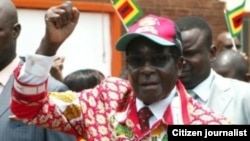The Zanu-PF central committee met in Harare Thursday to finalize the agenda of its 13th National People's Conference which officially opens in Gweru Friday.
The central committee adopted the agenda that was set by the Politburo at the party’s headquarters the previous day.
The Politburo and the central committee received reports from the party's national political commissar, Webster Shamu, on the recent election of provincial chairpersons in Matabeleland North and Bulawayo.
But Zanu PF raised concern over serious factionalism rocking the party in Masvingo Province.
Party leaders told VOA that because this particular conference takes place just ahead of an election year, it automatically assumes the status and consequence of a real congress though the party has suppressed debate on the succession issue.
President Robert Mugabe is turning 89 next year and Vice President John Nkomo is reportedly in poor health. This is said to be unsettling many party supporters.
However, Zanu PF spokesman Rugare Gumbo said his party is ready for the annual conference.
Commenting on the central committees and Politburo meetings, Gumbo said: “Basically we were looking at the state of the party, we were looking at ways of mobilizing our people and specifically looking at the agenda for tomorrow (Friday).”
Zanu PF will float the indigenization as the main theme at this year’s conference which media pundits say it may be President Mugabe’s final journey as the octogenarian prepares to contest in what could be his last election next year.
In a heated panel discussion on VOA, political activist Pedzisai Ruhanya slammed the conference as another yearly “political ritual” by Zanu PF.
Ruhanya said: “The idea that Mugabe has never faced any internal contest in Zanu since 1977 tells us that the political institution called Zanu PF is a political oligarchy. It is a political monarchy which is allergic and is an aberration to internal democratic practices.”
But Tafadzwa Musarara, chairman of Resources Exploration Watch, said Zanu PF must be judged according to its own rules and regulations and that provincial structures should meet prior to the conference and decide future leadership endorsements.
The central committee adopted the agenda that was set by the Politburo at the party’s headquarters the previous day.
The Politburo and the central committee received reports from the party's national political commissar, Webster Shamu, on the recent election of provincial chairpersons in Matabeleland North and Bulawayo.
But Zanu PF raised concern over serious factionalism rocking the party in Masvingo Province.
Party leaders told VOA that because this particular conference takes place just ahead of an election year, it automatically assumes the status and consequence of a real congress though the party has suppressed debate on the succession issue.
President Robert Mugabe is turning 89 next year and Vice President John Nkomo is reportedly in poor health. This is said to be unsettling many party supporters.
However, Zanu PF spokesman Rugare Gumbo said his party is ready for the annual conference.
Commenting on the central committees and Politburo meetings, Gumbo said: “Basically we were looking at the state of the party, we were looking at ways of mobilizing our people and specifically looking at the agenda for tomorrow (Friday).”
Zanu PF will float the indigenization as the main theme at this year’s conference which media pundits say it may be President Mugabe’s final journey as the octogenarian prepares to contest in what could be his last election next year.
In a heated panel discussion on VOA, political activist Pedzisai Ruhanya slammed the conference as another yearly “political ritual” by Zanu PF.
Ruhanya said: “The idea that Mugabe has never faced any internal contest in Zanu since 1977 tells us that the political institution called Zanu PF is a political oligarchy. It is a political monarchy which is allergic and is an aberration to internal democratic practices.”
But Tafadzwa Musarara, chairman of Resources Exploration Watch, said Zanu PF must be judged according to its own rules and regulations and that provincial structures should meet prior to the conference and decide future leadership endorsements.





